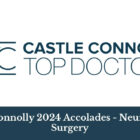If you have been diagnosed with trigeminal neuralgia, then you may know that there are many different treatments available for your condition. Your doctor may prescribe you medication or injections to help control your pain.
Many patients with persistent facial pain symptoms benefit from meeting with a neurosurgeon who specializes in trigeminal neuralgia to consider definitive treatment in trigeminal neuralgia surgery.
Your neurosurgeon should be a trusted resource, offering you various surgical options for your condition. He or she should explain the surgery and the risks and benefits associated with each procedure.
Your doctor should also take time to explain to you what to do to prepare for surgery and what your expected course will be after surgery. Knowing what to expect for your trigeminal neuralgia surgery recovery process can help you have the best possible recovery and outcome.
Surgery for Trigeminal Neuralgia
If you have trigeminal neuralgia, there are different types of surgical procedures available. Some of these procedures, like Gamma Knife Radiosurgery, may be done on an outpatient basis where you can go home within a few hours of the surgery. Others require a short hospital stay.
The goal of trigeminal neuralgia surgery is to take pressure off of your trigeminal nerve to relieve your pain or to slightly damage the nerve to disrupt painful transmissions through the nerve. Your doctor can explain to you the best surgery for your particular condition.
The definitive surgery for trigeminal neuralgia is microvascular decompression (MVD) surgery. During this procedure, your neurosurgeon will make a small incision behind your ear, and a tiny portion of your skull will be removed so your doctor can visualize your trigeminal nerve.
During the surgery, a small Teflon pad will be placed between your trigeminal nerve and its neighboring artery or vein. This helps to decompress the nerve to decrease the facial pain that you are feeling. After the surgery, your incision will be closed and you can begin the recovery process.
Trigeminal Neuralgia Surgery Recovery
Properly being prepared for surgery means that you have a reasonable expectation of your trigeminal neuralgia surgery recovery. That way there will be no surprises after your surgery and you can maximize your chances of having the best recovery possible.
Preparing for Surgery
Trigeminal neuralgia surgery recovery starts with proper preparation. Your doctor will give you specific instructions about how to prepare for your surgery. Some doctor’s offices offer a pre-operative learning session. During this session you will learn about different aspects of your surgery.
Different topics included during pre-op education class may include:
- The different healthcare professionals working with you
- Types of medical equipment that you may encounter during and after your surgery
- Pain control and medication use after surgery
- A live or virtual tour of the hospital surgical center
- Preparing for surgery can help you have a positive outlook on the procedure and can help you focus properly on your trigeminal neuralgia surgery recovery.
Are you out of options to eliminate your pain?
Surgery Day
On the day of surgery, you will report to the hospital at an assigned time. Your nursing team will prepare you for surgery by taking vital signs and by starting the necessary IV lines. During this time, your doctor will meet with you to review the surgery one final time to and be sure that you are ready for surgery.
You will be brought to the operating room where you will be greeted by your nursing team, doctor and anesthesia team. Medication will be used to put you under general anesthesia, and your surgeon will perform the surgery.
Shortly after the surgery, you will awaken from anesthesia in the recovery room. Your nursing team will monitor your vital signs, and your doctor will meet with you to discuss your surgical procedure and how things went.
Your facial symptoms will be monitored, as many patients receive rapid abatement of facial pain with the surgery. When it is determined that you are stable, you will be transported to an intensive care unit in the hospital for 24 hour monitoring and care.
Post-op Day 1
After your microvascular decompression surgery, you will spend one day in the ICU for careful monitoring of your condition. Your doctor will meet with you to monitor your trigeminal neuralgia surgery recovery.
Your symptoms will be checked, and medication will be adjusted accordingly to maximize your comfort. After 24 hours in ICU, you will be transferred to a regular hospital room for a day to slowly increase your mobility.
In the hospital, it is expected that you are able to get out of bed and into a chair independently. You can also start walking from your chair to the restroom and up and down the corridors to increase your endurance and mobility. You can expect to be discharged home from the hospital by the second or third day after surgery.
The First Week after Surgery
One week after surgery, you will meet with your neurosurgeon in the office. He/she will inspect your incision for signs of infection, and will check your trigeminal neuralgia symptoms. Most patients start to feel relatively normal at this point, with slight facial numbness or pain. Medication will be adjusted at this time as well.
During the first week of your trigeminal neuralgia surgery recovery, you can slowly increase your mobility at home. Going for short walks and performing normal housework is expected. You should avoid excessive lifting or high intensity tasks during this time. By the end of the week, you should be feeling relatively normal.
Three Weeks after Surgery
Three weeks into your trigeminal neuralgia surgery recovery, you can expect to return to your normal activity level while continuing to avoid high intensity activities. Your facial pain symptoms should be minimal or gone by this time, and you will follow up with your doctor to ensure that your recovery has gone smoothly.
If you have a sedentary or light job, you may return to work during this three week period of the trigeminal neuralgia surgery recovery timeline. If your job requires heavy lifting or high intensity activity, you should consider waiting a few more weeks to return to your work.
Your doctor can help you determine when the best time to return to work and normal activities will be after surgery. If you have trigeminal neuralgia, working closely with a trusted neurosurgeon is advised to consider definitive treatment with microvascular decompression surgery.
Your doctor can help you understand what to expect during your trigeminal neuralgia surgery recovery. By knowing what to expect after surgery, you can give yourself the best recovery possible for your trigeminal neuralgia symptoms.

About Neurosurgeons of NJ
Introducing our team of board certified physicians dedicated to bringing you the latest developments and treatment options. We strive to produce the most clarified & clear content to help you make informed decisions on your medical journey. The road to feeling like your true self should not feel lonely- Let us help you. Please call us to schedule a consultation and speak to one of your team members.






